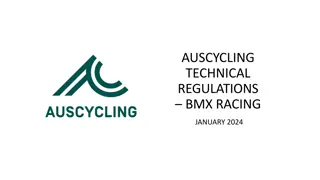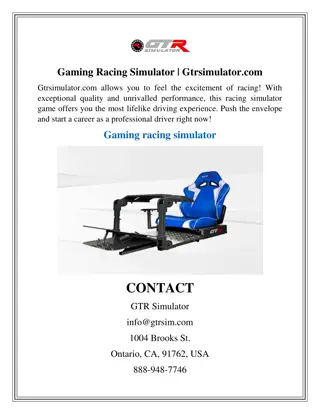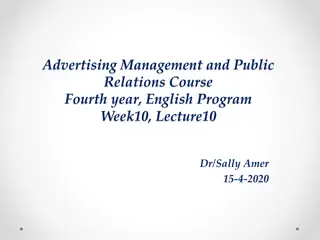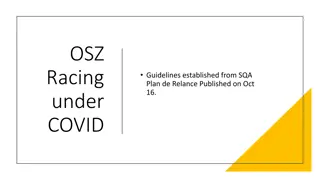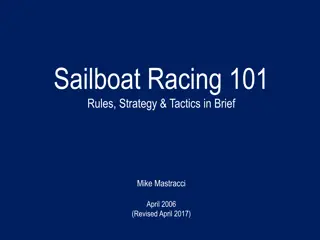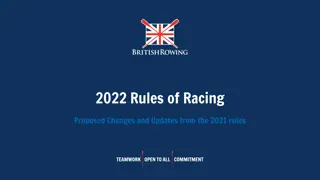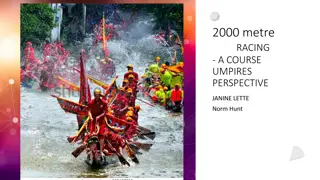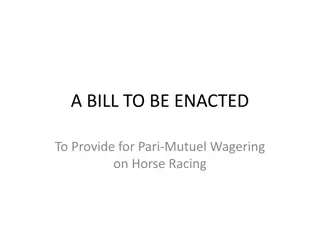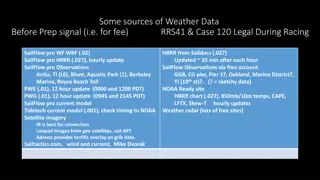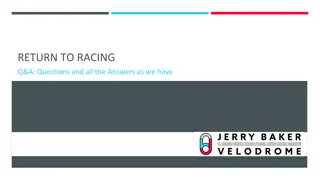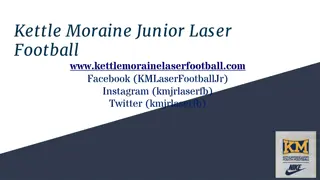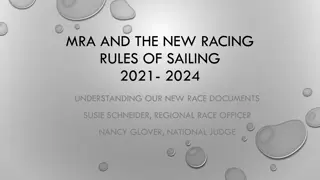Rules of Racing 2020: Guidelines for Junior Competitors
The Rules of Racing 2020 outline regulations for junior competitors in rowing events, specifying age bands, eligibility criteria, and exceptions. It includes details on age classifications for juniors, restrictions on participation in various events, and guidelines for coxes. Additionally, it addresses membership card requirements, crew substitutions, and safety measures related to foot release in boats. The rules are set to take effect on April 1st and encompass important provisions for ensuring fair and safe racing practices.
Download Presentation

Please find below an Image/Link to download the presentation.
The content on the website is provided AS IS for your information and personal use only. It may not be sold, licensed, or shared on other websites without obtaining consent from the author.If you encounter any issues during the download, it is possible that the publisher has removed the file from their server.
You are allowed to download the files provided on this website for personal or commercial use, subject to the condition that they are used lawfully. All files are the property of their respective owners.
The content on the website is provided AS IS for your information and personal use only. It may not be sold, licensed, or shared on other websites without obtaining consent from the author.
E N D
Presentation Transcript
Rules of Racing 2020 These will come into effect on 1st April
Juniors (2-3) a. A junior is a competitor who had not attained 18 years of age by 00:00 on 1st September preceding the competition (except when Rule 2-3d applies). b. Junior age bands run from 1st September until 31st August. c. Juniors who have not attained 11, 12, 13, 14, 15, 16, 17 or 18 years of age by 00:00 on 1st September preceding the competition are classified as being in the following age bands J11, J12, J13, J14, J15, J16, J17 and J18 respectively. The age bands J11 to J18 are equivalent to school years 6 to 13 respectively. d. A junior whose age band is higher than the age band for the school year group in which they have been placed may apply to the National Competition Committee to compete at one age band lower. The approval of both an individual who has parental responsibility for the athlete and the club welfare and safeguarding officer must be obtained before making the application. As part of the application, the head/principal of the athlete s school or college is required to confirm that the athlete is in that school year group. The National Competition Committee after an individual assessment in each case may, or may not confirm the application which will apply for that academic year only. Further applications may be made in subsequent academic years.
Juniors e. use of Rule 2-3d. Rule 2-3d does not apply to single scullers, pairs or doubles. f. Juniors in age band J14 or below are not permitted to race in sweep- oared events (coxes excepted). g. Juniors in age band J14 or below are not permitted to race in events that are more than one age band above their own age band nor in Senior events (para-rowers, adaptive rowers and coxes excepted). h. Coxes of junior crews must be juniors (except when Rule 2-3d applies). i. Coxes of junior crews are not sub-classified by age. No more than one competitor per crew (coxes excepted may make
Control Commission 7-2-3 The membership card is the primary means of identification and should always be carried. If the card is not available (e.g. lost or not yet received) then other forms of photographic identification can be used. 7-2-4b All the rowing members of a crew, and the cox, may be substituted until the official close of entries. Thereafter up to half of the rowing members of a crew and the cox may be substituted before the crew s first race in an event. Any substitute must fulfil the requirements of Rule 2-1-1 and the Personal Ranking Reference Book, and be approved as eligible by the Organising Committee.
Control Commission Foot Release. In all boats the foot stretchers, shoes or other devices holding the feet of the rowers shall be a type which allows the rowers to get clear of the boat with no delay in an emergency. Where shoes or other devices holding the feet will not remain in the boat, each shoe or device must be able to be released by the rower without using their hands or with a single quick hand action of pulling on one easily accessible strap or release device. In addition, where laces, Velcro or similar materials must be opened before the rower can remove their feet from the shoes or other device, all such materials must be able to be released immediately by the rower with a single quick hand action of pulling on one easily accessible strap.
Control commission The forward port and starboard rigger on all boats, other than single sculls, should be protected by a backstay. Blade colours (was 7-2-8g) which was planned to be brought into force this year has been removed from the rules
Masters (Appendix G) The handicap times are then deducted from the actual finishing times of each crew to determine the winners of each event. The category spread can include all categories, if necessary, to give all entrants a race, but in principle the spread should not normally exceed 3 where entries allow.
Masters (7-3-4d) The handicap is [x] seconds. I will start you like this: After the roll call I will say Attention, Go and I will then use a stop watch to count aloud down from [x-1] to 1 and then Go . Crew(s) [..] you will start on my first Go , crew(s) [..] you will start on my second Go . I will use the red flag on each start. Is that clear? If there are two different handicaps in the race there will be two separate countdowns, for example Go-5-4-3-2-1-Go-4-3-2-1-Go for a 6 seconds and 5 seconds handicap.
Admin 5-5-1 It is the responsibility of the competition s organising committee to publicise the competition. Any published material shall be approved by the local Regional Umpiring Committee in advance and shall note that the competition will comply with the British Rowing Rules of Racing. 5-5-2 Competition entrants are advised to make it clear in the BROE comments field if any doubling up is being sought (see Appendix A, 9n). n. Doubling up: is the process whereby an individual or a crew enters more than one event in the same competition or enters the same event twice if allowed by the competition.
Admin 5-5-3b No official of the competition shall disclose the identity of crews entered into any event but the Organising Committee may at its discretion report the state of the entry list for any events prior to the lists being closed. The Organising Committee may state which clubs have entered but may not give details of which events they have entered. 5-5-3f Copies of the draw, timetable of racing for the events entered and the safety instructions (see 5-2-3) shall be sent before the competition to each club, whose responsibility it is to distribute them to the crews.
Admin 5-5-4b Competitions may check the identity of winners and any winner who cannot confirm their identity shall not receive any crew or individual prize until their eligibility has been confirmed in 7-2-3.
And finally a reminder If you have any foreign crews (Irish or Scottish included) it s up to you to check their racing history to ensure that they are placed in the correct band If you have any foreign members join (Irish and Scottish included) then check that they have correctly declared their racing history and do not continue to use their Scottish card. Same applies to freshers who might have rowed as juniors. Checks are done in BROE2 to detect this sort of behaviour





